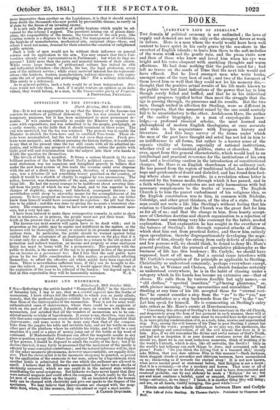OPPOSITION TO THE INCOME-TAX.
.2Verth Brixton, 20th October 1851.
Sin—It is not an exaggeration to say that the history of the Income-tax convicts its authors of political dishonesty. The tax was created to serve temporary, purposes, but it has been maintained to meet permanent de- mands. It was enacted specially to enable the Minister to equalize in- come with expenditure, and was submitted to by the people, grudgingly, as a costly remedy, on the faith that it should terminate in three years. The end was answered, but the tax was retained. The pretext was to enable the Minister to abolish the Corn-laws and to establish Free-trade. These ob- jects were accomplished, but the tax did not even then cease. Fresh pre- texts were assigned ; and, without pursuing the history further, it is sufficient to say that at the present time the tax still exists with all its admitted in- justice, and without any prospect of its adjustment, unless the public with right good will and determination take the subject into their own hands to decide the question for themselves. The breach of faith is manifest. It forms a serious blemish in the most brilliant portion of the late Sir Robert Peel's political career. That emi- nent statesman was too sagacious and farsighted gravely to believe that under the new fiscal system of free trade the revenue could ever dispense with the aid of a direct tax. His proposal, therefore, of a temporary mea- sure, was a delusion Cif not something worse) practised on the country, of which it would be a stretch of charity to suppose he was unconscious. The policy, however' was characteristic of the man, and consistent with his pre- vious life. He had the moral courage to be indifferent about severing him- self from the party of which he was the head, and to rise superior to the charges of duplicity, apostacy, and falsehood, consequent thereon : he nevertheless could stoop to unworthy means for the accomplishment of his purpose. To have proposed an income-tax for a permanency, no one better knew than himself would have occasioned its rejection : the pill had there- fore to be gilded ; and this was done by giving the measure a transitory cha- racter. The consequence is, that we have now not only a permanent mea- sure, but a very bad one.
I have been induced to make these retrospective remarks in order to show that in ministers, as in princes, the people must not put their trust. This truth at the present time is of practical importance.
The Income-tax next session will again have to be dealt with ; and in proportion as the public may be supine and indifferent in the matter, so the measure will be thoroughly revised, or retained in its present odious and ini- quitous form. In particular, the public should be warned against being cajoled into the acceptance of an inadequate measure on the plea that it is to exist only for a short time. Unless there be a return to the old system of protection and indirect taxation, an income and property or some analogous direct tax must be borne with for a permanency. The question with the public to decide, is the nature of the tax to be proposed in lieu of the present one on income as a permanent tax. But I fear that the said public have given by far too little consideration to this matter, so peculiarly affecting themselves, to afford the effective aid which might have been expected of them. There is nevertheless sufficient time, if they can be brought to dis- cuss the subject. At present, however, it would appear they fondly hope at the expiration of the year to be relieved of the burden : but depend upon it,
that in this expectation they will be lamentably mistaken. W. S.


























 Previous page
Previous page